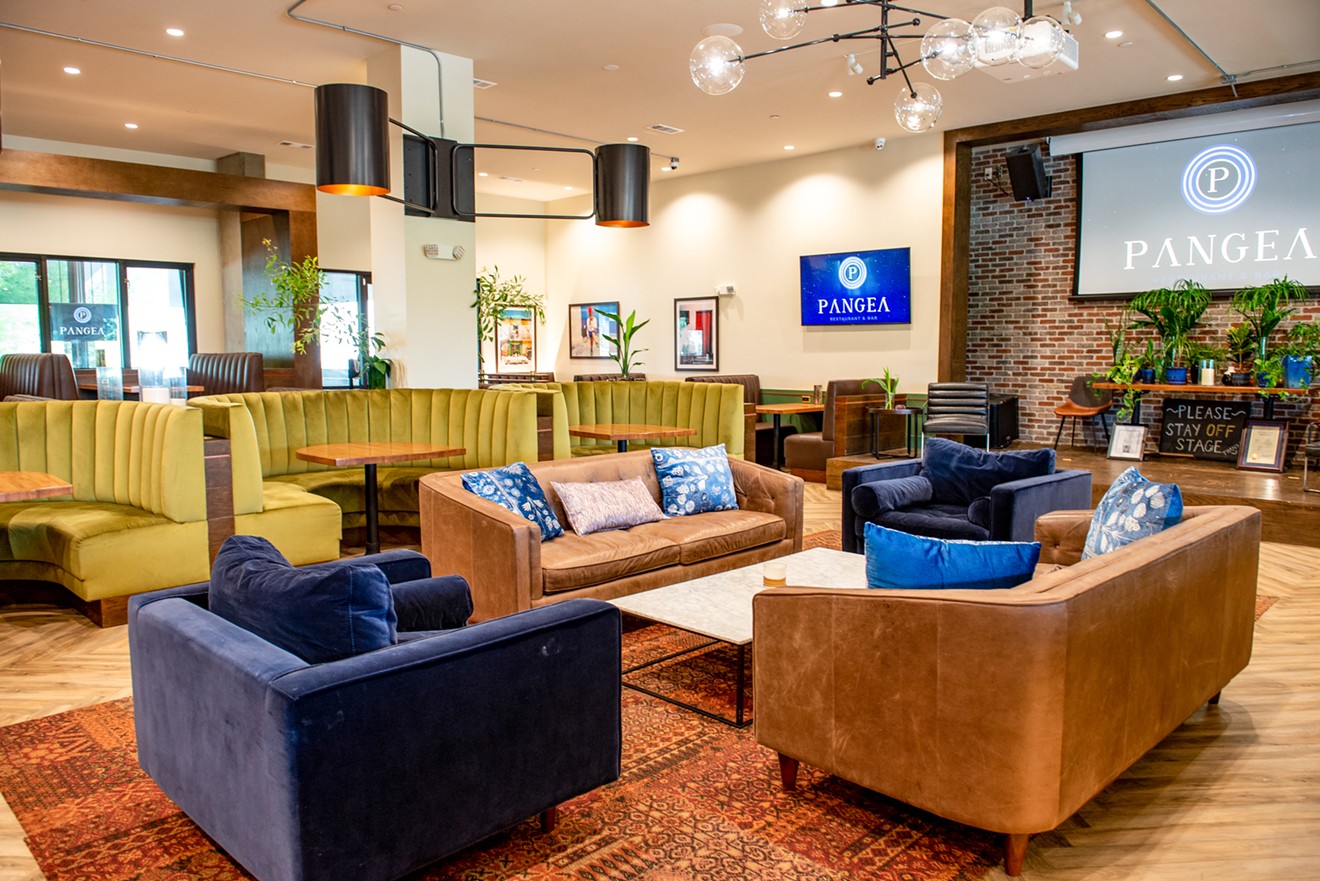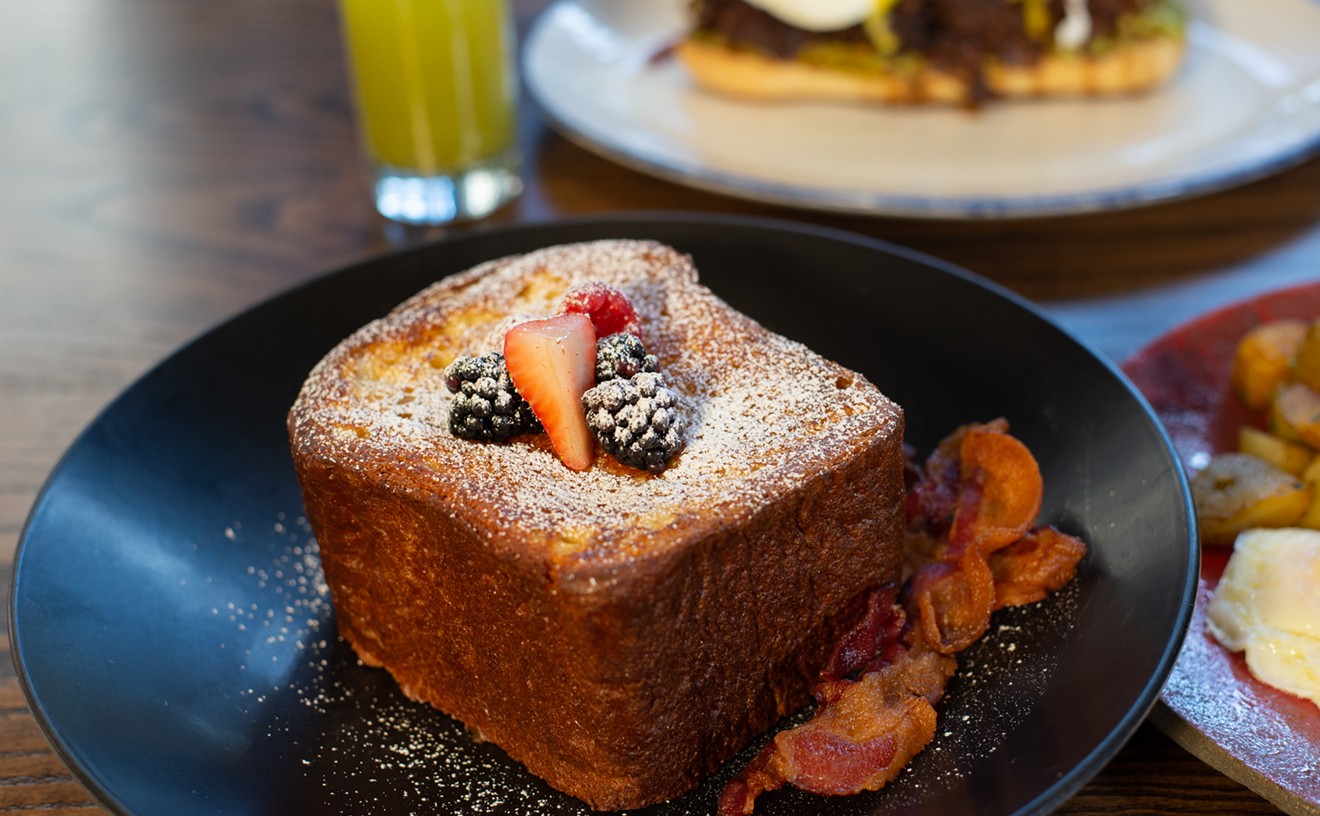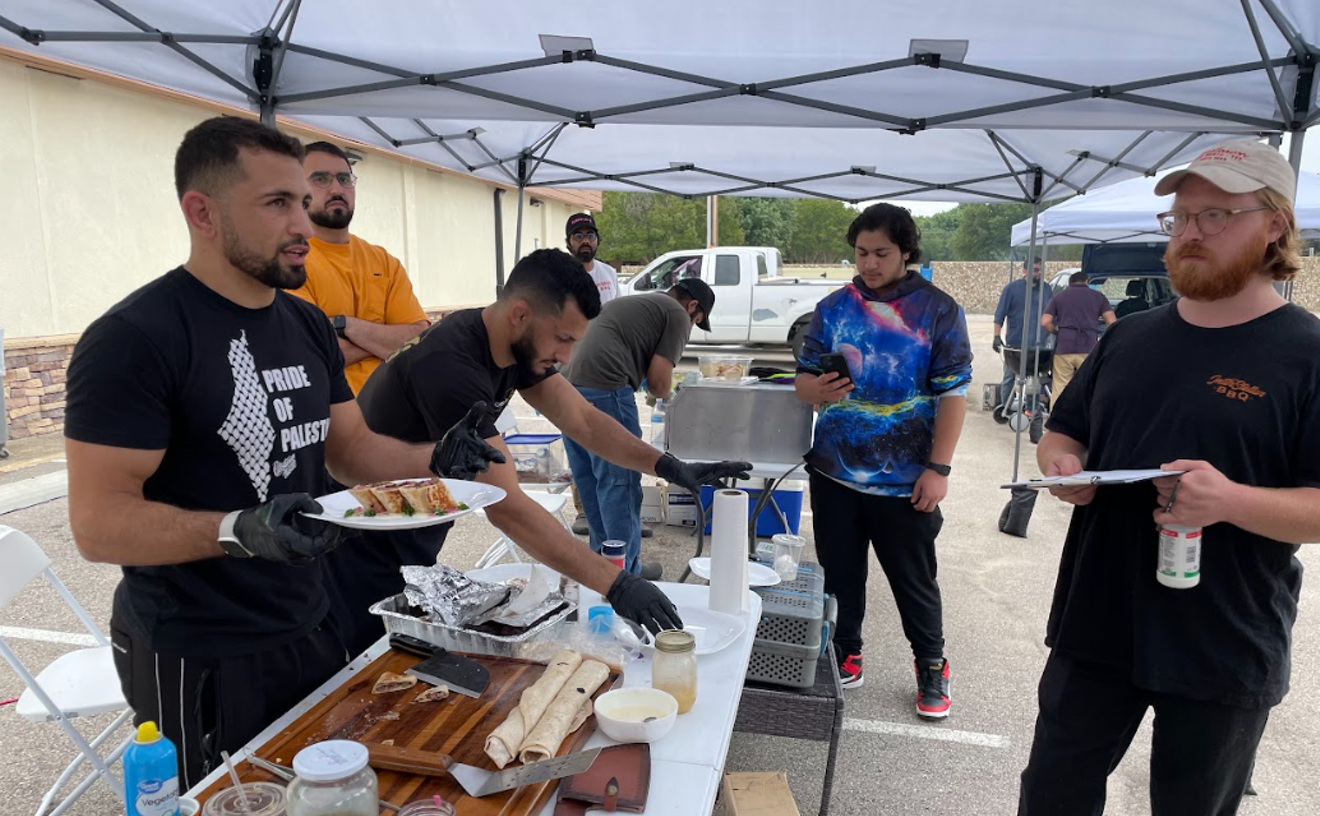I can’t believe I’m saying this, but ambitious young chefs looking for big opportunities to show off their skills should consider the suburbs.
This goes against everything an urbanist Oak Cliff dweller like me should believe. But the thought was inescapable as I walked into Pangea, a triumphant new Garland restaurant where chef Kevin Ashade effortlessly weaves his African roots into a fine dining menu that looks like a world map.
Pangea is on the ground floor of the first of more than a dozen gleaming new apartment blocks on Garland’s northern edge. For the apartment complex, Berkshire Spring Creek, the restaurant is a signature amenity; for Ashade, it’s a chance to make a big, bold statement.
His dining space is huge, starting with an entry lounge filled with sofas and coffee tables. Metal scaffolding hangs above the bar like a booze monument. Booths are set high up, as if on stage. Flatscreens play sports on nearly every wall. There are two different patios. The flooring is parquet-style.
Even more ambitiously, Pangea is named after the supercontinent that, 200 million years ago, contained all the land on the planet.
“Everything was connected,” Ashade says. “There was no separation. The same thing with my food. I have Italian, Asian, African — all the foods. No matter what mood you are in, I will be able to find some food for you.”
In other words: A whole lot is happening at Pangea, which opened in January, and it’s up to Ashade’s vision and colleagues to tie everything together.
Delivering foods from across the entire world is a big task. But if anyone can serve West African dishes like suya and jollof rice alongside steaks and cheesecakes, it’s Ashade, who has a background in just about every cuisine there is.
“I’m world-trained,” Ashade says. “I’m African. I know a lot of European stuff. I grew up in Texas. I worked in New York. I’ve lived in England, Spain and Nigeria. I learned French technique. So I had a little bit of everything.”
Born in Dallas, Ashade grew up in two kitchens, cooking with his African mother and his best friend’s Jamaican parents.
I’d recommend starting a journey into this chef’s mind with an appetizer of suya, the West African barbecue skewers that resemble kebabs. Ashade’s meats, bell peppers and onions are coated in a spice rub that’s hot, salty, peanutty and bold — the biggest flavor I’ve encountered since restaurants shut down in March.
We sampled the shrimp suya ($12) and found tender shrimp on three skewers over a tiny bed of greens. The greens look like a garnish, but as spices drip off the meat and peppers, they become a tangy salad instead.
By contrast, the greens underneath the Jamaican beef pastries simply wilt. But the pastries themselves are soft, gently sweet squares with crimped edges, filled with ground beef, red and black pepper, allspice and Caribbean heat ($12). I could snack on a box of them throughout the week.
Jamaican seasonings reappear on the lamb shank main course, an enormous serving of meat — Ashade calls it his “dinosaur bone” — which is perfectly cooked ($36). It’s tempting to overcook lamb shanks until the meat flops off the bone in a steamy mess, but Pangea avoids that mistake. This lamb is fork-tender but firm, and the jerk spices are soul-warming.
Pangea has some of the area’s best crab cakes, by the way. They’re $16, but that’s because they’re filled to the very edges with crabmeat and seasoning, and only barely enough filler to hold the cakes together.
Ashade’s most famous dish, though, is coq au vin, which is teasingly titled “Have Merci!” because it was with this recipe that Ashade won an episode of Beat Bobby Flay. Flay, perplexed by the challenge of cooking a dish that typically braises all afternoon in the show’s 45-minute time limit, produced inferior, inconsistent chicken. Ashade had a trick up his sleeve: He fried his chicken first, then added it to the sauce.
Watch the episode on Hulu, then head to Garland and try the winning plate ($30). Ashade’s coq au vin has the nostalgic, wine-heavy, long-cooked flavor that leaves French people licking their silverware. The spices folded in are subtle but beautiful; the mashed potatoes underneath have some texture and an indulgent amount of butter and garlic.
Those same mashed potatoes can be had with the lamb shank or as a heaping $6 side. This brings me to another point: Aside from the salads, it can be hard to encounter vegetables at Pangea. Ashade is gifted with carbohydrates; at one point, my table for two stared down at plates bearing mashed potatoes, grits, risotto, cornbread and macaroni, all at once.
The champion starch, by the way, is the side order of grits, real-deal, long-cooking grits with a blend of five cheeses and seeded jalapeños ($6). But the jollof risotto, a gentle tweak on the long-stewed tomato and rice dish from West Africa, is great, too, and especially handy to cool down the heat of suya ($6).
One thing I noticed, after driving back to Oak Cliff one night with takeout coq au vin and an Argentine chimichurri-topped steak ($38) in the passenger seat, is that Pangea’s food travels poorly. That’s because the meats rely on good sears and precise cook times; in a takeout box on a long drive, they steam themselves.
It’s well worth the effort to try Pangea’s food near its source. Sit at the restaurant’s two enormous patios, where strict headcounts prevent crowding. Or pack a picnic blanket and bring takeout to the nearby Spring Creek Greenbelt or Breckinridge Park.
Ashade says he’s had clients drive in from all over, even from Arlington and Mansfield. But he sees his Garland location as a major asset, capturing a neighborhood that doesn’t have a lot of fine dining. Here, the menu is more upscale, the atmosphere is one where you might dress up a bit, the price point is a little higher, but you're still comfortable, it's not too fancy.
“There’s nothing like it around here,” he says. “A lot of people are tired of driving downtown, downtown traffic — it kind of gives you the New York or Chicago vibe, but it’s up in the suburbs. People up in the suburbs, they love places like this, but they don’t want to drive downtown. I’m in it for the long haul. I’m not in it to be here five years and quit. The young crowd [is] cool, but I’m also in it for families, for people out here who want to have a good time, too.”
Hear that, young chefs? The suburbs are beckoning. And they’ll welcome even the most ambitious chefs, even a chef who uses his African roots as the starting point for a menu that attempts to span the whole world.
Pangea, 6309 N. President George Bush Hwy., No. 8101, Garland. 214-703-2222, pangeadallas.com. Open 4 to 10 p.m. Tuesday through Thursday; 4 to 11 p.m. Friday; 10 a.m. to 2:30 p.m. and 4 to 11 p.m. Saturday; 10 a.m. to 2:30 p.m. and 4 to 9 p.m. Sunday.
[
{
"name": "Air - MediumRectangle - Inline Content - Mobile Display Size",
"component": "18855504",
"insertPoint": "2",
"requiredCountToDisplay": "2"
},{
"name": "Editor Picks",
"component": "17105533",
"insertPoint": "4",
"requiredCountToDisplay": "1"
},{
"name": "Inline Links",
"component": "18349797",
"insertPoint": "8th",
"startingPoint": 8,
"requiredCountToDisplay": "7",
"maxInsertions": 25
},{
"name": "Air - MediumRectangle - Combo - Inline Content",
"component": "17105532",
"insertPoint": "8th",
"startingPoint": 8,
"requiredCountToDisplay": "7",
"maxInsertions": 25
},{
"name": "Inline Links",
"component": "18349797",
"insertPoint": "8th",
"startingPoint": 12,
"requiredCountToDisplay": "11",
"maxInsertions": 25
},{
"name": "Air - Leaderboard Tower - Combo - Inline Content",
"component": "17105535",
"insertPoint": "8th",
"startingPoint": 12,
"requiredCountToDisplay": "11",
"maxInsertions": 25
}
]















